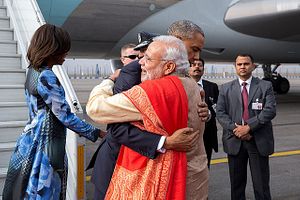Indian Prime Minister Narendra Modi will be visiting the U.S. in June, where he will address Congress at the invitation of Speaker Paul Ryan. Modi will be the fifth Indian prime minister to address that body, following Rajiv Gandhi, P.V. Narasimha Rao, Atal Bihari Vajpayee, and Manmohan Singh.
It will also be Modi’s fourth visit to the U.S. in two years. Since his election, Modi has strengthened India’s strategic partnership with the U.S., while also seeking to enhance economic ties, much to the surprise of some pundits who had no hesitation predicting that he would focus more on Asia, while preferring a transactional relationship with Washington.
Instead, Modi has taken some significant steps to reach out to the U.S., perhaps most notably his decision to invite U.S. President Barack Obama as chief guest at the 2015 Republic Day Parade. What clearly emerges is that the bilateral relationship has been “institutionalized” in the strategic sphere, with a number of convergences, especially in the context of issues like the South China Sea dispute. Both countries have also “in principle” signed the Logistics Support Agreement, which will deepen defense cooperation.
A number of strategic analysts in India argue that a Republican in the White House would be better for India than a Democrat would be. If one were to look at the primaries, India has found mention a few times. While the candidate set to win the Republican nomination, Donald Trump, first mentioned India in the context of taking away U.S. jobs and also imitated an Indian call center worker, he also recently spoke about using India to stabilize Pakistan. Strategic analysts in India who are skeptical about a Democrat president have naturally taken note of Trump’s remarks, arguing that Hillary Clinton – the likely Democrat nominee – will be much softer on Pakistan.
A number of points need to be kept in mind when looking at the bilateral relationship. In the strategic sphere, ties have moved beyond personalities and parties. Few would have thought that Modi would have visited America four times in two years. It would have also been unimaginable to think that a Congress prime minister would invest so much in the India-U.S. relationship as Manmohan Singh did, although a recalcitrant opposition and sections of the old guard in his own party did not support his initiatives.
Second, while it is true that the relationship witnessed a high during the tenure of a Republican president, namely President George W Bush, the foundations for a strong relationship were laid by President Bill Clinton, a Democrat. Just a few month’s after India’s nuclear tests – which prompted condemnation from Washington – then Prime Minister Atal Bihari Vajpayee spoke about the affinities between the countries, especially their democratic credentials. This was followed by a visit to India by Clinton in March 2000 and a visit to the U.S. by Vajpayee in September 2000. Meanwhile, Obama, a Democrat, is the only U.S. president to have visited India twice, and has not adhered to the traditional practice of visiting Pakistan afterwards. During his second term, the U.S. president has also sought to find common ground with India on the South China Sea issue.
In the economic sphere, the relationship is transactional. Much will depend on India’s economic performance and whether it can initiate what are often called “big-bang” reforms, one of them being the GST.
During his address to the U.S.-India Business Council in his January 2015 visit, Obama noted that America’s trade with China far outstrips that with India. “We are moving in the right direction…That said, we also know that the U.S.-India relationship is defined by so much untapped potential,” Obama said. “Every one here will agree, we’ve got to do better.”
Even Trump has spoken about the close relationship between China and U.S. in the economic sphere, although he has taken a tougher line on strategic issues. Indeed, in the economic sphere, India will need to address the concerns of U.S. investors, especially with regard to red tape — and not just in New Delhi, but in its states as well.
So it would be fair to say that the India-U.S. relationship is very likely to strengthen in the strategic sphere, irrespective of which party takes power in Washington. The only issue on which there could be a divergence with a future regime could be Iran, an important strategic partner for India. Even Hillary Clinton is likely to take a very different approach to Iran than Obama’s bold and imaginative policy.
Tridivesh Singh Maini is a New Delhi-based policy analyst associated with The Jindal School of International Affairs, Sonipat.

































